When it comes to choosing the best baby formula, you want to make sure you're providing your little one with the optimal nutrition for their growth and development. With a plethora of options available on the market, it can be overwhelming to decide which formula is truly the best fit for your baby. From organic to specialized formulas and various brands boasting different features, the selection process can seem daunting. However, by understanding the key factors to consider and exploring the diverse options out there, you can confidently make an informed decision that prioritizes your baby's well-being.
Key Factors to Consider
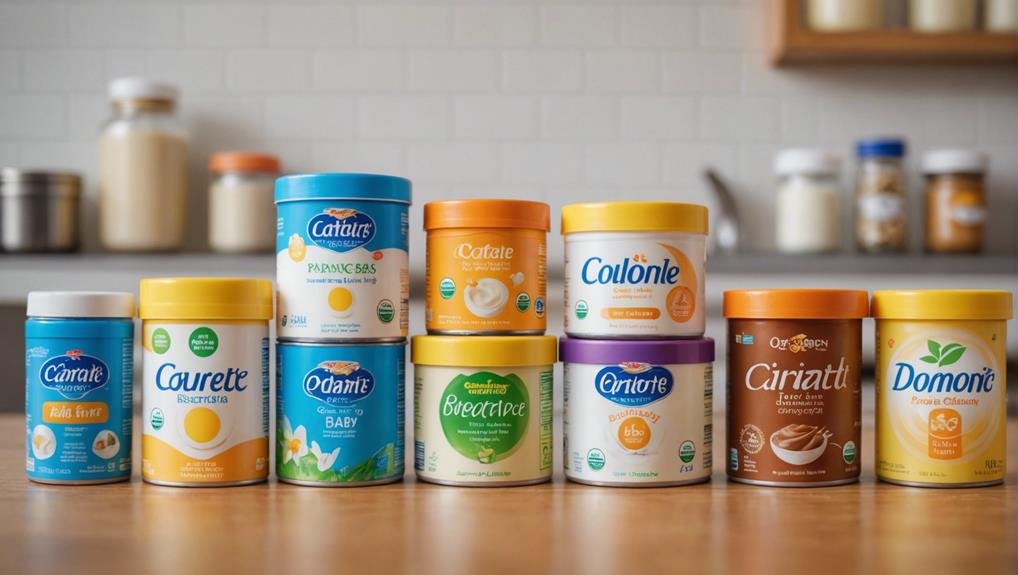
When choosing the best baby formula, it's essential to consider key factors such as the baby's age, any dietary restrictions, and the presence of any allergies. Nutritional content plays a crucial role in ensuring your baby receives the necessary vitamins and minerals for healthy growth and development. Price comparison is also significant, as formulas can vary greatly in cost.
Packaging options are another consideration. Some formulas come in convenient ready-to-feed bottles, while others are in powder form that needs to be mixed with water.
Customer reviews can provide valuable insights into the formula's taste, ease of digestion, and overall satisfaction from other parents who've used the product.
Top Brands and Their Features
Considering the variety of baby formulas available, understanding the top brands and their distinctive features can help you make an informed decision for your baby's nutrition. When looking at formula ingredients, reputable brands like Similac, Enfamil, and Gerber tend to use key components like DHA, ARA, and prebiotics to support your baby's growth and development. These ingredients are often backed by scientific research and are recommended by pediatricians.
Baby formula reviews can also provide valuable insights into the experiences of other parents. Checking platforms like Amazon, consumer reports, or parenting forums can give you an idea of how different formulas have worked for babies in terms of digestion, fussiness, and overall health.
Some brands may have specific features like added probiotics for gut health or specialized formulas for premature babies. Understanding these nuances can help you choose the best baby formula for your little one. Remember to consult with your pediatrician to ensure the formula you select aligns with your baby's individual needs and any potential dietary restrictions.
Organic Vs. Non-Organic
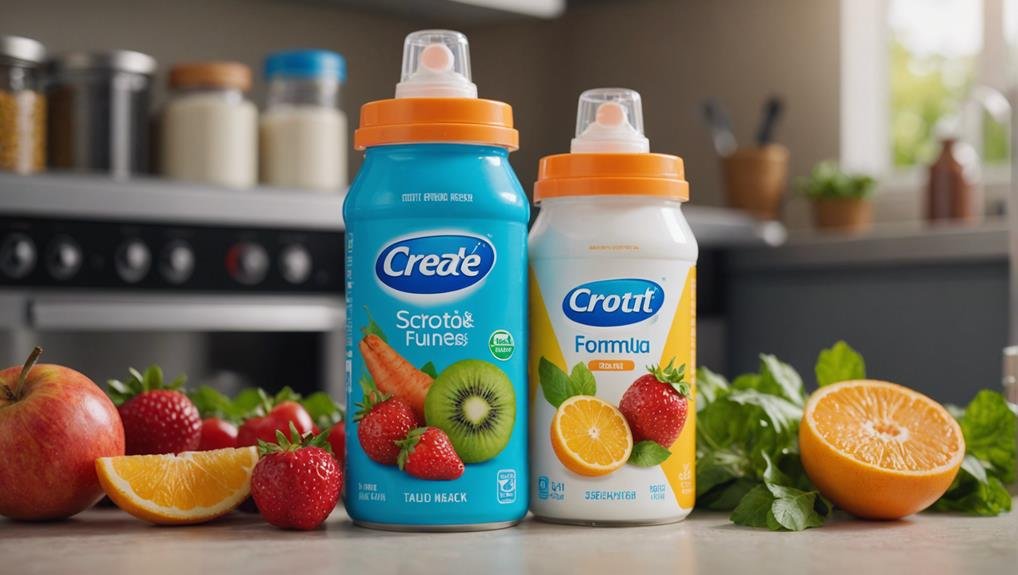
To make an informed decision about the best baby formula for your child, it's important to understand the differences between organic and non-organic options. Organic baby formulas are made from ingredients that are grown without synthetic pesticides or fertilizers, offering potential health benefits by reducing your baby's exposure to harmful chemicals. They also have a lower environmental impact as they promote sustainable farming practices. However, organic formulas tend to be more expensive than their non-organic counterparts and may not be as readily available in all stores.
On the other hand, non-organic baby formulas are typically more affordable and easier to find in most supermarkets. While they provide essential nutrients for your baby's growth and development, they may contain ingredients that were exposed to pesticides during cultivation. This could potentially pose health risks in the long run.
When choosing between organic and non-organic formulas, consider the health benefits, environmental impact, cost, and availability to make the best choice for your little one's needs.
Specialized Formulas for Different Needs
You may find that specialized baby formulas cater to different needs based on specific health conditions or dietary preferences. When it comes to nutritional requirements, certain formulas are designed to address specific needs such as preterm birth, low birth weight, or conditions like reflux. These formulas are fortified with nutrients to support optimal growth and development for babies with these particular requirements.
For infants with digestive issues, specialized formulas can offer solutions to common problems like gas, constipation, or colic. Formulas with added probiotics, partially hydrolyzed proteins, or easy-to-digest proteins can help alleviate these discomforts and promote better digestion. Always consult with a healthcare provider before switching to a specialized formula to ensure it aligns with your baby's needs.
Understanding your baby's unique nutritional and digestive needs is crucial in selecting the most suitable formula. By considering these factors and consulting with healthcare professionals when needed, you can ensure that your little one receives the essential nourishment required for healthy growth and development.
Allergen-Free Options
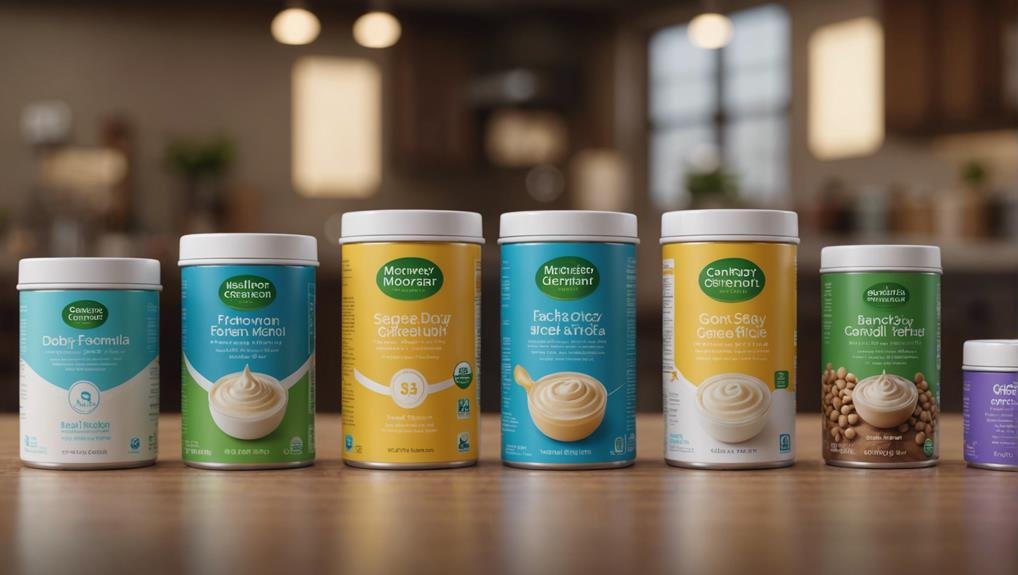
Explore the range of allergen-free baby formulas available to cater to infants with specific sensitivities or allergies. For babies with dairy allergies, dairy alternatives like soy-based formulas can be a suitable option. These formulas are made from soy protein isolate and are fortified with essential vitamins and minerals to ensure your baby receives the necessary nutritional supplements for healthy growth and development.
Hypoallergenic options are also available for infants with more severe allergies. These formulas are extensively hydrolyzed, breaking down the proteins into smaller parts, making them easier to digest and less likely to trigger an allergic reaction. Some hypoallergenic formulas are also amino acid-based, providing a complete source of protein for infants with extreme sensitivities.
When choosing an allergen-free formula for your baby, it's essential to consult with a healthcare provider to determine the best option based on your baby's specific needs and allergies. Always monitor your baby's response to the formula and seek medical advice if there are any concerns regarding allergies or intolerances.
Pros and Cons of Powder Vs. Liquid
When considering baby formula options, it's important to weigh the advantages and disadvantages of powder versus liquid formulations. Powdered formula tends to be more cost-effective than liquid, making it a budget-friendly choice. It also has a longer shelf life and is easier to store since it doesn't require refrigeration until it's mixed with water. This can be convenient when you need a formula that can be prepared quickly and on-the-go.
On the other hand, liquid formula is pre-mixed and ready to feed, saving you time and effort, especially during nighttime feedings. It's also known for having a smoother consistency, which some babies may prefer. However, liquid formulas are more expensive than powdered ones and need to be used within a certain timeframe once opened, which can lead to wastage if not finished promptly.
In terms of nutritional content, both powder and liquid formulas are formulated to provide essential nutrients for your baby's growth and development. Ultimately, the choice between powder and liquid formula depends on your lifestyle, budget, and feeding preferences.
Budget-Friendly Choices
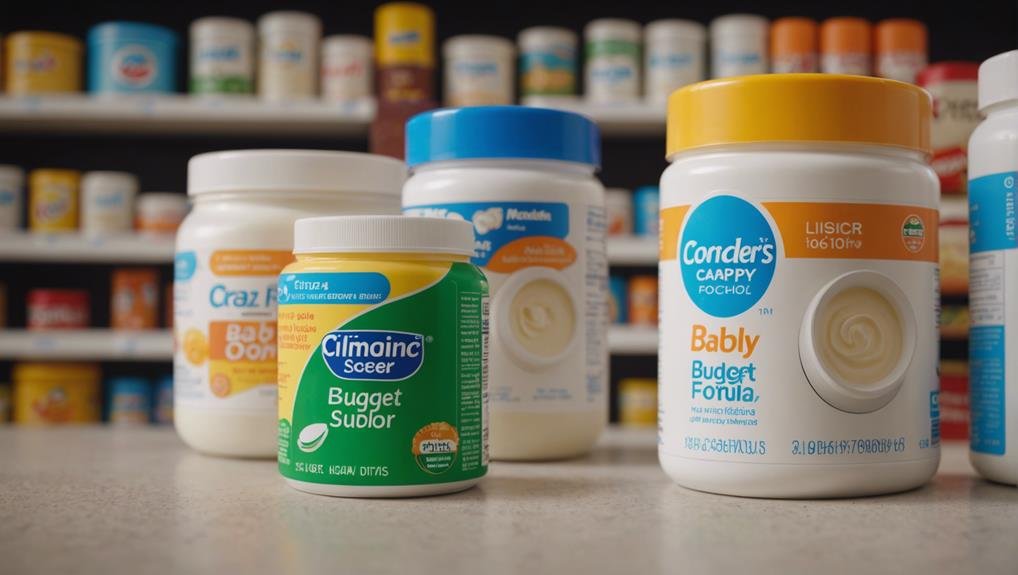
Consider opting for powder baby formula as it provides a cost-effective choice for budget-conscious parents looking to provide essential nutrition for their little ones.
Powder formulas are typically more affordable than ready-to-feed or liquid concentrate options, making them a great budget-friendly choice without compromising on quality. If you're concerned about ingredient safety and nutritional value, many generic brands offer formulas that meet the same rigorous standards as more expensive options.
These generic brands can provide all the necessary nutrients for your baby's growth and development while being easier on your wallet.
For those seeking even more budget-friendly choices, homemade alternatives can be considered. However, it's crucial to consult with your pediatrician to ensure that the homemade formula meets your baby's nutritional needs. While homemade options may seem cost-effective, they can pose risks if not formulated correctly.
Ready-To-Feed Vs. Concentrate
Choosing between ready-to-feed and liquid concentrate baby formulas can significantly impact both convenience and cost for parents seeking a suitable option for their little ones' nutrition needs. Ready-to-feed formulas are the most convenient option as they require no mixing or measuring, making them ideal for on-the-go feeding. However, they tend to be more expensive than liquid concentrate formulas.
On the other hand, liquid concentrate formulas are more cost-effective and eco-friendly since they come in smaller packaging. When it comes to nutritional value, both ready-to-feed and liquid concentrate formulas provide similar nutrients as they're regulated by the FDA.
Whether you choose ready-to-feed or liquid concentrate, it's essential to follow proper storage tips to maintain the integrity of the formula. Store both types in a cool, dry place and ensure they're tightly sealed when not in use. Ultimately, the decision between ready-to-feed and liquid concentrate formulas boils down to your preference for convenience and cost-effective options.
European Formula Options
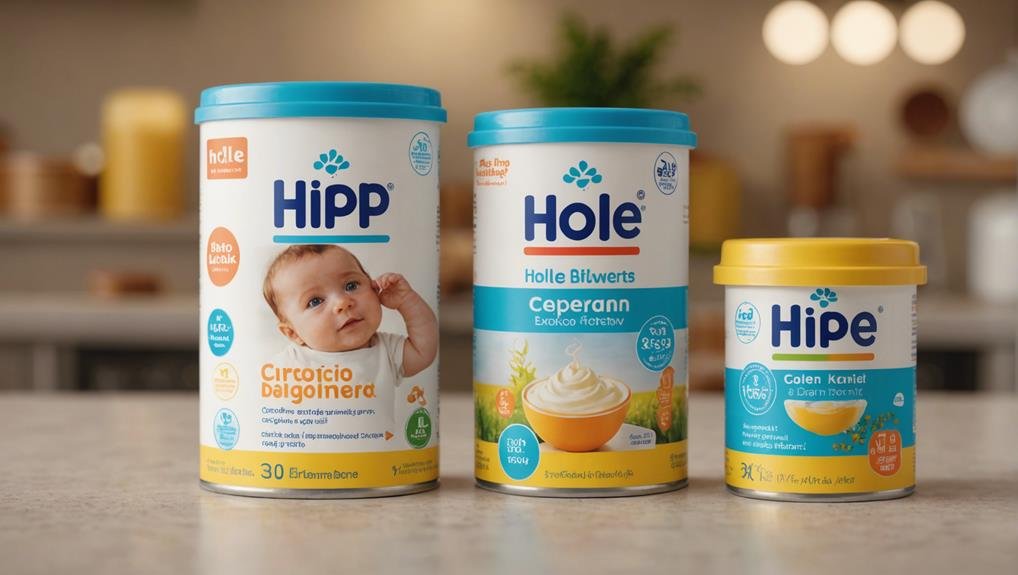
Exploring the diverse range of European formula options can provide parents with additional choices for their baby's nutrition needs. European formulas are known for their high-quality ingredients, stringent regulations, and potential benefits for infants.
These formulas often contain key nutrients such as DHA, ARA, probiotics, and prebiotics, which are essential for a baby's growth and development.
One significant advantage of European formulas is the strict regulations governing their production. European countries have stringent guidelines for the composition and safety of infant formula, ensuring that these products meet high standards of quality.
This can offer parents peace of mind regarding the nutritional content and safety of the formula they're feeding their little ones.
European formulas are becoming increasingly available worldwide, with many online retailers now offering a variety of options for parents to choose from. This accessibility allows parents to explore different European brands and find a formula that best suits their baby's needs.
When considering European formulas, it's essential to consult with a healthcare provider to ensure that the chosen product meets the specific nutritional requirements of the infant.
Homemade Baby Formula Recipes
Crafting your own homemade baby formula can be a rewarding and cost-effective alternative for parents seeking more control over their baby's nutrition. When preparing homemade baby formula, it's crucial to focus on achieving nutritional balance.
Some key ingredients to include are whole cow's milk, a source of essential fatty acids like coconut oil, and a carbohydrate source such as lactose. However, it's important to avoid certain ingredients like honey, corn syrup, and regular cow's milk, as they can pose health risks to infants.
Preparation methods for homemade baby formula typically involve blending the ingredients thoroughly to ensure a smooth consistency. It's recommended to use sterilized equipment and prepare the formula in small batches to maintain freshness.
Additionally, storing the homemade formula in a clean, airtight container in the refrigerator for up to 24 hours can help preserve its quality and prevent bacterial contamination. By following proper preparation and storage tips, you can provide your baby with a nutritious homemade formula tailored to their needs.
Frequently Asked Questions
Can Baby Formula Be Used Past the Expiration Date?
Yes, baby formula should not be used past the expiration date for formula safety. Proper storage, following best practices, is essential to maintain its quality. Remember, expired formula may not provide adequate nutrition for your baby.
How Should Baby Formula Be Stored After Opening?
After opening, remember to store baby formula correctly. Refrigeration is key. Proper storage maintains freshness and nutritional value, ensuring your baby gets the best. Follow guidelines for safety and your little one's health.
Are There Any Risks Associated With Switching Baby Formulas?
When switching baby formulas, there are potential risks to consider, such as allergies and nutritional concerns. It's essential to monitor for any adverse reactions and consult with a healthcare provider to ensure a smooth transition.
What Are the Common Signs of Formula Intolerance in Babies?
If your baby shows signs of formula intolerance, such as allergy symptoms like rashes or digestive issues like excessive gas or spitting up, consult your pediatrician for guidance. They can help identify the cause and recommend suitable solutions.
Can Baby Formula Help With Acid Reflux in Infants?
When dealing with acid reflux in infants, feeding techniques play a crucial role in managing symptoms. Look for signs of improvement such as reduced spitting up and fussiness. Address parental concerns promptly and seek guidance from a pediatrician for personalized advice.
Conclusion
In the vast world of baby formulas, remember to choose wisely like a parent bird carefully selecting the best nest for its chick.
Consider your baby's unique needs, explore top brands like Similac and Enfamil, and don't shy away from specialized formulas if required.
Whether opting for organic or non-organic, prioritize your little one's health above all else.
Trust your instincts and consult with healthcare providers to ensure your baby thrives on the best formula possible.

